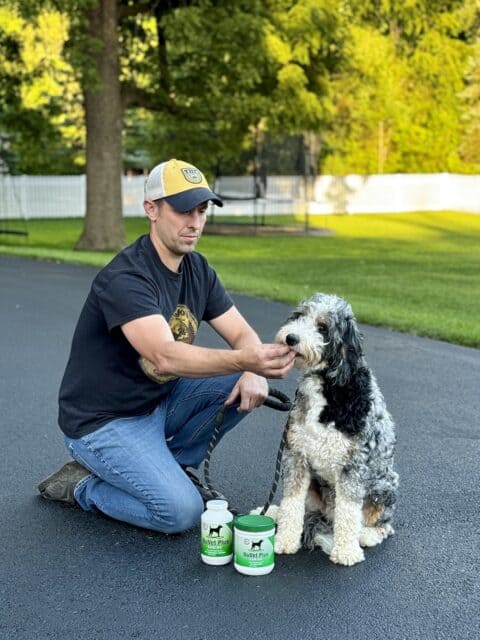For the past several decades, Goldendoodles have become one of the most popular dog breeds in the world. These lovable dogs are a cross between a Golden Retriever and a Poodle, making them the perfect combination of smart, loyal, gentle, and adorable. Additionally, since they’re at least half Poodle, Goldendoodles are also hypoallergenic and non-shedding!
The average lifespan of a Goldendoodle is anywhere from 10 to 15 years. As with all dogs, however, this varies depending on several factors, including diet, lifestyle, and how well you care for them. A Goldendoodle’s lifespan can also vary depending on the size of your dog, as smaller dogs tend to live longer than larger ones.
If you’re curious and want to know how much time you can expect to have with your Goldendoodle, you’ve come to the right place. We will break down the typical lifespan of a Goldendoodle, how to extend it, and potential health problems to watch out for.
What’s the oldest Goldendoodle alive today?
Let’s start out by giving you a glimmer of hope for how long your Goldendoodle can live. According to a Reddit thread I stumbled across, one person reported having friends who own a Goldendoodle that’s 18 years old! Granted, they said the dog is as deaf as a doorknob, but it still gets as excited as a puppy anytime it sees them.
What about the average lifespan?
While living for 17 to 18 years and beyond is not impossible for Goldendoodles, it’s certainly on the long end. On average, Goldendoodles tend to live for anywhere from 10 to 15 years. The main reason is that Golden Retrievers live an average of 10 to 12 years, and Poodles live an average of 12 to 15. Therefore, 10 to 15 years is right on par with the two breeds that make up a Goldendoodle.
Many of the pure breed health risks are reduced in a designer breed, like the Goldendoodle.
Does the lifespan vary within doodles?

If you’re at all familiar with Goldendoodles, you know that there are several different types and sizes within the breed. Here’s a quick rundown of the sizes and generations:
Sizes
- Small or mini: 15 to 35 pounds
- Medium: 35 to 50 pounds
- Large or standard: 50 to 100+ pounds
Generations
- F1 Goldendoodle: This is the first generation and is a cross between a Golden Retriever and a Poodle.
- F1B Goldendoodle: The offspring of an F1 Goldendoodle and a Poodle
- F2 Goldendoodle: A second-generation Goldendoodle, which is the offspring of two F1 Goldendoodles
- Multigen Goldendoodle: A Goldendoodle where both parents are also Goldendoodles, but not both F1’s.
For the most part, the type or generation of Goldendoodle you have doesn’t play a significant factor in its potential lifespan. Gender also doesn’t play much of a role, as males can live just as long as females.
What can make a difference, however, is the size of your Goldendoodle. In general, small doodles have fewer potential health problems than large ones and can live an average of 3-5 years longer. However, if you give your puppy plenty of exercise, feed it a healthy diet, and take it to the vet for regular checkups, you can usually offset this difference.
Signs your Goldendoodle is slowing down
As your Goldendoodle gets older, it will start to show signs of slowing down. For instance, it will get fewer cases of the “zoomies” and won’t jump up on your furniture as much. They will also be less prone to jumping to greet visitors and will opt to walk rather than run.
However, just because your dog is showing signs of getting older and slowing down doesn’t mean it’s on death’s door. Consider people, for example. At 43 years of age, I’m also much less likely to run and jump than I once was. That doesn’t mean I’m nearing the end of my life. It simply means that I’ve matured, calmed down, and understand my physical limitations ????.
The same is true of your Goldendoodle. Slowing down simply means that they’ve calmed down and don’t have as much energy as they once did. They can still have 4–6 good, healthy years of life left in them!
At what age do they start slowing down?
In general, Goldendoodle’s are in the “puppy” stage until they’re three years old. During that time, they will have seemingly unlimited energy and stamina. Between the ages of 3 and 10, they will still have energy, but it will steadily decrease the older they get.
Once they reach age 10, they will start to slow down even more. This is typically when they choose walking over running and are less prone to jumping on furniture.
What can I do to extend the lifespan of my Goldendoodle?
The good news about Goldendoodles is that you can do things to make their lives as long and healthy as possible. If you want to spend as much time with your Doodle as possible, here’s what you can do.
1. Give them the right supplements

While your Goldendoodle likely isn’t going to chow down on fruits and vegetables, they need many of those same vitamins and minerals in their daily diet. Therefore, consider investing in pet supplements, such as NuVet Plus supplements. These supplements will help build your pet’s immune system and strengthen their bones and joints, which is especially important with standard-sized Goldendoodles.
2. Choose healthy food
In the same way that you’ll have a shorter lifespan if you eat McDonald’s and Burger King every day, your dog will also suffer if you give them cheap, low-grade dog food. While I’m not going to trash any dog food brands in particular, some are certainly better than others.
The key to choosing healthy dog food is to read the ingredients. Dog food should be fairly straightforward and have as few additives and fillers as possible. Here are a few trusted brands to consider:
- Purina Pro Plan
- Royal Canin
- Acana (great for if your dog needs a grain-free diet)
If you have room in your budget, you can also opt for fresh, wet dog food, such as The Farmer’s Dog. However, wet foods are more expensive than dry foods, and it’s important that you leave room in your budget for supplements and vet visits.
3. Take them in for regular checkups
It’s also important that you stay up to date on your Goldendoodle’s vaccinations and shots so that they’re less prone to illness and disease.
While they’re getting their vaccinations, have your vet give your dog a thorough checkup. This includes checking their teeth, ears, heart, bones, and joints for potential issues. It’s always easier to fix a medical problem when you catch it early on as opposed to months or years down the road.
4. Exercise them regularly

Finally, it’s imperative that your dog gets regular exercise. Aside from your Goldendoodle’s diet, the amount of exercise they get will have the biggest impact on their lifespan. A well-exercised dog who has room to run and play outdoors or goes on regular walks will almost always outlive a dog with a stagnant lifestyle.
What decreases their lifespan?
In the same way that you can increase your doodle’s lifespan, there are also things you can do that may decrease it.
1. Cheap, low-grade dog food
The worst thing you can do for your dog is give them bad dog food. Bad dog food is more likely to lead to obesity and heart health problems, which will decrease their lifespan.
While high-quality dog food is more expensive than the low-grade stuff, there are things you can do to save money while giving your dog the food it needs. At stores like Pet Supplies Plus and Petco, for instance, when you become a member or order online, every tenth bag of dog food is free!
2. A stagnant lifestyle
A stagnant lifestyle leads to a shortened lifespan, plain and simple.
The less activity your Goldendoodle gets, the more likely they are to become obese. When this happens, it puts extra weight on their already under exercised bones and joints and can lead to serious health complications, such as hip dysplasia and heart disease. According to Pet MD, these are the two most common health problems Goldendoodles face, so you must guard against them.
How long do they live compared to similar breeds?

In general, Goldendoodles have a very similar life expectancy compared to similar breeds, such as a Bernedoodle or Labradoodle.
Goldendoodles also have a longer life expectancy and fewer potential health problems than other large dog breeds. This is mostly because they are part poodle, and poodles are one of the healthiest large dog breeds in the world.
Potential health concerns
While Goldendoodles are generally healthier and live longer than other large breeds, they do have their own set of potential problems. For instance, doodles are more prone to yeast infections and food allergies than other large breeds. While yeast is usually very manageable, food allergies can lead to IBS, IBD, Crohn’s Disease, and other digestive problems.
If your dog starts showing signs of digestive issues or a food allergy, you should switch their dog food, immediately. Your best bet is to move to food with a different meat as the main ingredient, such as fish or red meat. If their symptoms get worse, take them to your vet for a thorough checkup and a proper diagnosis.
Final thoughts
Overall, Goldendoodles are a highly healthy dog breed with an average lifespan of 10 to 15 years. However, with proper care and nutrition, they can live even longer! To make this happen, it’s imperative to feed your dog the right food and supplements, get them plenty of exercise, and take them to the vet when necessary.
If you’re worried about your Goldendoodle or have questions about how to improve its health, call me at (574) 596-0350. I’ve been raising Goldendoodles for over 9 years. Additionally, if you happen to have a question I don’t know the answer to, I’ll direct you to someone who does!

